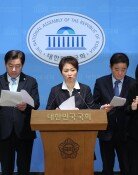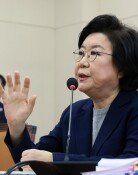Former UPP members should be prohibited from standing for by-election
Former UPP members should be prohibited from standing for by-election
Posted February. 06, 2015 07:27,
Former lawmakers Lee Sang-kyu and Kim Mi-hee, who were deprived of seats in the National Assembly due to disbandment of the Unified Progressive Party (UPP), announced their candidacy for the by-election scheduled on April 29. This by-election is to fill up local constituency seats that became vacant due to the Constitutional Courts decision to dissolve the minor opposition party. There is no legal issue for them to stand for by-election. However, the two former UPP lawmakers attempt to vie for by-election seats, despite Constitutional Courts ruling, does not fit the intent of the court as the decision was made for a reason of "(the partys) risk to destroy democratic basic orders."
This situation took place because there is no detailed rule on the follow-up measures after dissolution of a political party and the political sector did not take subsequent actions. The Constitutional Court deprived the UPP lawmakers of assembly seats at the same time when delivering the ruling to dissolve the party, but the court did not deprive them of local assembly seats. In fact, there is no explicit legal ground to deprive the defunct UPP members of seats in the National Assembly. The Constitutional Court made the ruling by interpreting fundamental object of the party dissolution.
When the Nazi-oriented Socialist Reich Party disbanded in 1952, the German Federal Constitutional Court announced deprivation of the party members seats in the federal and state parliaments even though there was no stipulated law. Afterwards, the court revised the Federal Election Act to introduce rules on deprivation of parliamentary seats and restriction of eligibility for elections. Ruling Saenuri Rep. Kim Jin-tae and other lawmakers already proposed a revision for the Public Official Election Act, even 1 year before the CCs decision to disband the party, which aims to deprive a defunct partys lawmakers, local assembly members and local government heads of their seats and restrict their qualification to stand for election for 10 years. But the revision has not been passed by the National Assembly yet.
The political arena must fix related legal loopholes. Even though an act on deprivation of local assembly seats is established right now, it is hard to apply the law retroactively. However lawmakers must hurry to make a law to restrict lawmakers and local congressmen of a dissolved party from standing for elections for a certain period. Otherwise, it would be hard to avoid a situation where lawmakers deprived of their assembly seats for unconstitutionality of the party run for elections, asking for judgment of the public. There is no way to prevent them from making a political party of similar character, unless the party uses the same name as UPP, or the partys creed is the same as or similar to the now-dissolved party.
Even though the two former UPP lawmakers run for the by-election, there is slim chance for them to be elected unless they form an opposition alliance. Kim and Lee may want to devalue the Constitutional Courts decision by gaining some votes. However, it is highly likely that the overall context of by-election would be distorted by their candidacy. Saenuri party may have postponed revision of the related law, because the former UPP lawmakers candidacy can divide votes for the opposition, which will serve to benefit of the ruling party. The ruling and opposition parties must take into consideration the Constitutional Courts intent behind the ruling on unconstitutionality of the UPP and the publics sentiment on the law, and develop a measure to restrict the former UPP lawmakers qualification to run for elections.






![하버드 의사가 실천하는 ‘뇌 노화 늦추는 6가지 습관’ [노화설계]](https://dimg.donga.com/c/138/175/90/1/wps/NEWS/IMAGE/2026/01/22/133210626.3.jpg)
